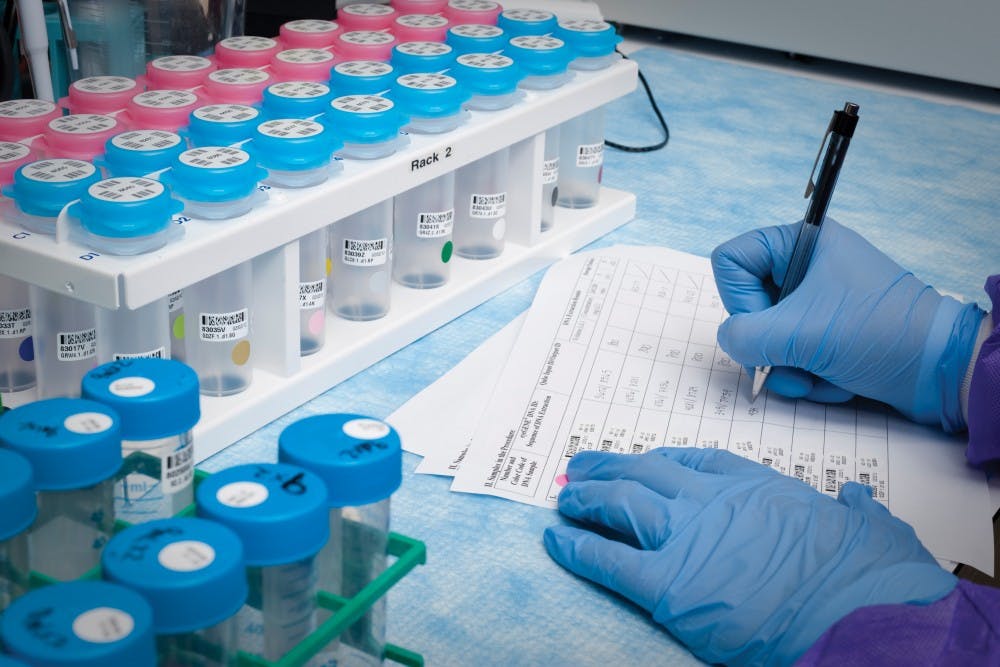
Research labs at Penn have missed deadlines for research results and cite a lack of funding from organizations such as the National Institutes of Health, but labs have been fined at this time.
Credit: Courtesy of National Eye Institute | Creative CommonsPenn’s research labs have consistently missed their deadlines to report the results of their clinical research studies. The labs are required by Public Law 110-85 to publish their results to ClinicalTrials.gov within 12 months of the completion of their studies or face fines from the National Institutes of Health.
Penn is aware of its tardiness. Michael Borda, director of research initiatives in the Office of the Vice Provost for Research, noted that Penn posts its research in many different venues. “Like our peer institutions, Penn has found that this task is much larger than expected, and the office of clinical research has taken this as a priority, and is working to address the backlog,” Borda wrote in an email.
The federal law was passed in 2007 after a series of lawsuits against drug manufacturer GlaxoSmithKline revealed the company was hiding dangerous side effects of its antidepressant Paxil. The U.S. Food & Drug Administration found an increased risk of suicide in children and teens taking the drug. Babies born to mothers taking the drug also had birth defects. These conditions were life-altering and life-threatening, but the company chose not to reveal them.
A Philadelphia jury in 2009 awarded $2.5 million to the Kilker family after their son Lyam was born with birth defects. DrugWatch.com, a website devoted to informing the public about dangerous drugs, reported that GlaxoSmithKline’s 1998 internal report found an “alarmingly high number” of birth defects associated with the drug, but the company failed to reveal these dangers.
Patients and doctors cannot gauge the benefits and dangers of a drug if researchers do not post their study results. STAT, a health news outlet, reported that Penn, along with Stanford University, the University of Pittsburgh and the University of California, San Diego are some of the “worst offenders” and “four of the top 10 recipients of federal medical research funding from the National Institutes of Health.”
Universities often cite a lack of funding and time to post their results before the deadline. Yet according to Penn Medicine’s website, the university received $409 million in awards from the NIH in 2015, the very organization responsible for imposing the fines on non-compliant research labs.
So far, neither the NIH nor the FDA has fined any of the four schools for their missed deadlines.
Penn completed two studies in 2012 and still has not reported the results. One of these studies, known as the Biomarker Study (NCT01148654) examined connections between levels of protein biomarkers that warn the body of premature labor, among other things, in pregnant women and potential dangers during birth. The study began in May 2008 and was completed in June 2012, but the Penn researchers have not yet posted the results. Three and a half years after the study’s completion, the researchers have missed their deadline.
The IMPaCT study (NCT01346462), which stands for Individualized Management Towards Patient-Centered Targets, studied the transition in care for socio-economically vulnerable patients who were being discharged at the time. This study began in May 2011 and was completed in December 2012, but no results have yet been posted.
The Daily Pennsylvanian is an independent, student-run newspaper. Please consider making a donation to support the coverage that shapes the University. Your generosity ensures a future of strong journalism at Penn.
DonatePlease note All comments are eligible for publication in The Daily Pennsylvanian.







